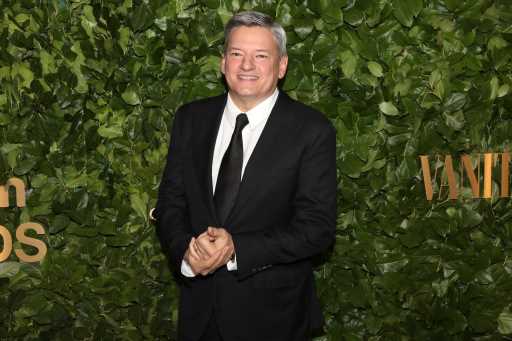Netflix Co-CEO Ted Sarandos affirmed recent comments from the company that they are not — despite strong indications from insiders as recently as last month — intending to bid on sports rights.
“We’ve not seen a profit path” from “renting big-league sports,” the exec shrugged during a keynote session at the UBS Global Technology, Media & Telecom Conference. “We’re not saying there never will be,” he added,” but “dramatically expensive” rights have made sports effectively a “loss leader.”
The company’s leap into ad-supported streaming last month is seen by many observers as a prelude to a serious sports effort, especially given the traction at Amazon and the big outlays by Apple in recent years. Sarandos, echoing comments last week by Co-CEO Reed Hastings, says the return on investment isn’t compelling enough. “We’re not anti-sports,” Sarandos explained. “We’re just pro-profit. We have yet to figure out how to do it. But I’m very confident we can get twice as big as we are without sports.” The streaming leader did “a thing that’s kind of unheard-of in the history of television” when it managed to get 165 million households to watch Squid Game “without having to premiere it after the Super Bowl. We didn’t need a big loss leader to build a mass audience.”
Related Story
'Wednesday' Becomes Netflix's Third Most-Popular English-Language TV Series Of All Time With 752.52M Hours Viewed
The success of Netflix’s behind-the-scenes series about Formula 1, Drive to Survive, led to reports that the streamer at least put out feelers when U.S. rights came up for renewal recently and were re-upped by Disney/ESPN. Sarandos said the impact Netflix had on building F1’s audience “should be able to translate” to a more reasonable financial burden for rights, but that inside track has never developed.
As to the ad tier, Sarandos said Netflix execs have “always have talked about our company as being a ‘choice’ company.” While he didn’t give any numbers for how the $7-a-month tier is faring, he cracked a smile by talking about his son’s budget-conscious choices as a young streaming consumer. “A lot of people, my son included, are willing to watch ads and take a lower price.” Being able to satisfy that demand “opens the market” and is unlikely to siphon off higher-paying ad-free subscribers, the co-chief said.
“Advertising for us is ‘crawl, walk, run.’ We just turned it on, and it works,” Sarandos said, calling it a “long-term initiative” and said there will “likely” be multiple tiers of ad-supported Netflix at different price points, but said details were still preliminary.
While Wall Street has projected a multi-billion-dollar opportunity for Netflix in the ad realm, Sarandos said roughly half of overall revenue from the new tier will be recognized in the U.S. That’s consistent with global media trends and the results of rival players with global operations.
Charging a small sum for password sharing, which is being tested in a handful of international markets. The initiative will be a major theme in 2023, Sarandos said. Based on the testing process, “it feels a lot like the way you manage a price increase. … Consumers aren’t going to love it right out of the gate, but we need to show them why they should see value.”
As with advertising, “we went too long ignoring” password sharing, Sarandos said. “We created a product that was not very easy for you to add your kids to and pay for that.”
Must Read Stories
James Cameron Intros Epic At London World Premiere; Red Carpet Gallery; More
‘Abbott Elementary’, ‘Better Call Saul’ Lead TV Noms; Full List & Analysis
Christine McCarthy Emerges As Top Contender To Succeed Bob Iger As CEO
Robert Downey Jr. On Father-Son Journey In ‘Sr.,’ Netflix Docu On His Filmmaker Dad
Read More About:
Source: Read Full Article
-
These Countries Have Most of the World’s Gold
-
Positive Reaction To Fed Minutes Contributes To Higher Close On Wall Street
-
Cities With the Most Racist Mortgage Lending Practices
-
Ron DeSantis Wants Trial In Disney Lawsuit To Start After Next Year’s Election While Company Requests A Speedier Timeline
-
White House Press Secretary: “No Indication Of Aliens Or Extraterrestrial Activity” Behind Aerial Objects Shot Down By Military




